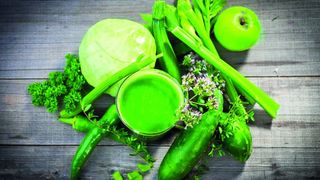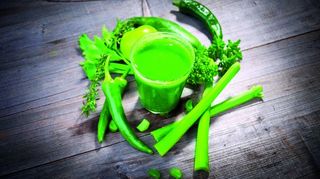Is Your Digestive System Working Properly?
Give your internal fuel station an MOT with these simple questions

Here’s a truth that might be hard to swallow: even if you’re prepping everything you eat, sticking religiously to your five-a-day and eating more wild-caught salmon than a grizzly bear, there’s a chance that your best-laid diet plans are falling apart the moment it all goes into your mouth. The part of the puzzle you might be missing? Digestion – the process by which your body extracts the essential components from all your carefully cooked creations. Coach's sister brand Men's Fitness spoke to the experts to tell you what's what.
“Ultimately, digestion is everything,” says Luke Leaman, body composition specialist and founder of Muscle Nerds. “If you’re not able to digest and assimilate your food you’re not able to get things into your body that you need.” The process starts before you take a bite: when you smell, look at or (according to some research) even think about food, your body begins the processes you need to digest it, from producing saliva to upregulating the enzymes it uses to break the food down. By giving your system a crucial nudge here and there, you’ll extract more nutrients from what you eat. Leaman explains how to make sure you’re not biting off more than you can, er, digest.
RECOMMENDED: Gut Check: Are You Eating Enough Microbes?
How can I tell if I’ve got problems with my digestion? Look at what’s coming out
“First, look in your toilet bowl. If there’s undigested food in there, it’s a sign you aren’t digesting or assimilating your food properly. Similarly if you’re eating and getting bloated, getting gassy, there could be a problem.”
“The first thing to address is chewing your food. William Banting, who wrote what’s often called the world’s first diet book, Letters On Corpulence, said that people weren’t chewing enough, and it’s still true today. Nobody really masticates: it’s just chew, chew, swallow. If you’re shovelling a Tupperware container of food down in 30 seconds, you aren’t helping yourself. It sounds like the dumbest thing ever, but do you chew until your food is liquid? That’s the easiest place to start.”
Why do I feel worse when I’m stressed? Because your body’s not focusing on digestion
Get the Coach Newsletter
Sign up for workout ideas, training advice, reviews of the latest gear and more.
“Stress impairs digestive function. If your body’s chronically stressed and in fight-or-flight mode, it won’t care about digestion. Stress also depletes the acids your stomach uses to break down food. If you’re really stressed, you’ll start pulling sodium into cells and retaining it, and you need sodium to make that acid. It’s not just about cortisol – if someone’s stressed for a long time, their body stops producing cortisol and starts running on adrenaline. The key is keeping the sympathetic nervous system in balance and achieving a ‘rest and digest’ state. Stretch, do yoga, have a nap, do some meditation… they all work on stress, and they’re all free.”
RECOMMENDED: Mindfulness Exercises and Apps
Your body doesn’t digest well under stressful conditions, and for good reason: for our ancestors, getting chased by a sabre-toothed tiger was a good time to divert resources to flight (or fighting) and not digestion. Unfortunately, your nervous system has trouble distinguishing between your nine-to-five worries and a life-or-death situation, and so you need to calm down. Download the Headspace app, take ten minutes a day to meditate, and add some mobility to your evening routine.
A key issue with digestion is surface area. Stretched out to full size, your small intestine has the same area as a tennis court. Stress denatures certain tissues in the intestine, which means food moves through your digestive system too quickly because of the reduction in surface area. Keep a handle on stress, and you’ll keep your small intestine in shape.
RECOMMENDED: How to Deal with Stress at Work

What about the things I actually eat? Think plants
“Eat like a vegan or a vegetarian and add meat if you want. You need vegetables for fibre, phytonutrients and a host of other stuff. A healthy body doesn’t want to be fat.”
RECOMMENDED: How to Get Started with a Plant-Based Diet
“Eat three or four meals a day. People eat six, eight, even ten times a day, but if you’re eating that much a day your body never has a chance to chill out. Aim to have three meals a day, with a shake or a snack around your workout. If you find you’re still hungry add something else elsewhere in the day.”
“There are a few options if you want to do this. A nice broad-spectrum digestive enzyme might help if you’re having issues. Also consider pepsin, which breaks down meat, or ox bile, which emulsifies fat. But they’re for fine-tuning once you’ve fixed the bigger stuff. Start on chewing, stress levels and the veg in your diet, then go from there.”
Coach is a health and fitness title. This byline is used for posting sponsored content, book extracts and the like. It is also used as a placeholder for articles published a long time ago when the original author is unclear. You can find out more about this publication and find the contact details of the editorial team on the About Us page.

